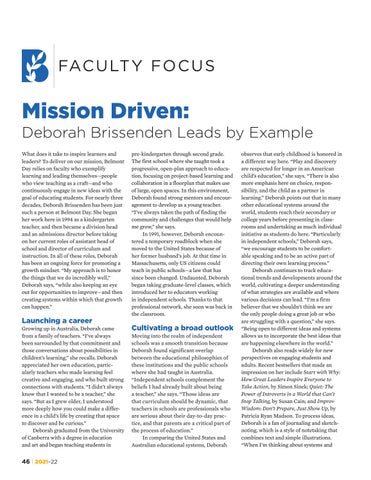FAC U LT Y FO C U S
Mission Driven:
Deborah Brissenden Leads by Example What does it take to inspire learners and leaders? To deliver on our mission, Belmont Day relies on faculty who exemplify learning and leading themselves—people who view teaching as a craft—and who continuously engage in new ideas with the goal of educating students. For nearly three decades, Deborah Brissenden has been just such a person at Belmont Day. She began her work here in 1994 as a kindergarten teacher, and then became a division head and an admissions director before taking on her current roles of assistant head of school and director of curriculum and instruction. In all of these roles, Deborah has been an ongoing force for promoting a growth mindset. “My approach is to honor the things that we do incredibly well,” Deborah says, “while also keeping an eye out for opportunities to improve—and then creating systems within which that growth can happen.”
Launching a career
Growing up in Australia, Deborah came from a family of teachers. “I’ve always been surrounded by that commitment and those conversations about possibilities in children’s learning,” she recalls. Deborah appreciated her own education, particularly teachers who made learning feel creative and engaging, and who built strong connections with students. “I didn’t always know that I wanted to be a teacher,” she says. “But as I grew older, I understood more deeply how you could make a difference in a child’s life by creating that space to discover and be curious.” Deborah graduated from the University of Canberra with a degree in education and art and began teaching students in
46 | 2021–22
pre-kindergarten through second grade. The first school where she taught took a progressive, open-plan approach to education, focusing on project-based learning and collaboration in a floorplan that makes use of large, open spaces. In this environment, Deborah found strong mentors and encouragement to develop as a young teacher. “I’ve always taken the path of finding the community and challenges that would help me grow,” she says. In 1991, however, Deborah encountered a temporary roadblock when she moved to the United States because of her former husband’s job. At that time in Massachusetts, only US citizens could teach in public schools—a law that has since been changed. Undaunted, Deborah began taking graduate-level classes, which introduced her to educators working in independent schools. Thanks to that professional network, she soon was back in the classroom.
Cultivating a broad outlook Moving into the realm of independent schools was a smooth transition because Deborah found significant overlap between the educational philosophies of these institutions and the public schools where she had taught in Australia. “Independent schools complement the beliefs I had already built about being a teacher,” she says. “Those ideas are that curriculum should be dynamic, that teachers in schools are professionals who are serious about their day-to-day practice, and that parents are a critical part of the process of education.” In comparing the United States and Australian educational systems, Deborah
observes that early childhood is honored in a different way here. “Play and discovery are respected for longer in an American child’s education,” she says. “There is also more emphasis here on choice, responsibility, and the child as a partner in learning.” Deborah points out that in many other educational systems around the world, students reach their secondary or college years before presenting in classrooms and undertaking as much individual initiative as students do here. “Particularly in independent schools,” Deborah says, “we encourage students to be comfortable speaking and to be an active part of directing their own learning process.” Deborah continues to track educational trends and developments around the world, cultivating a deeper understanding of what strategies are available and where various decisions can lead. “I’m a firm believer that we shouldn’t think we are the only people doing a great job or who are struggling with a question,” she says. “Being open to different ideas and systems allows us to incorporate the best ideas that are happening elsewhere in the world.” Deborah also reads widely for new perspectives on engaging students and adults. Recent bestsellers that made an impression on her include Start with Why: How Great Leaders Inspire Everyone to Take Action, by Simon Sinek; Quiet: The Power of Introverts in a World that Can’t Stop Talking, by Susan Cain; and Improv Wisdom: Don’t Prepare, Just Show Up, by Patricia Ryan Madson. To process ideas, Deborah is a fan of journaling and sketchnoting, which is a style of notetaking that combines text and simple illustrations. “When I’m thinking about systems and


